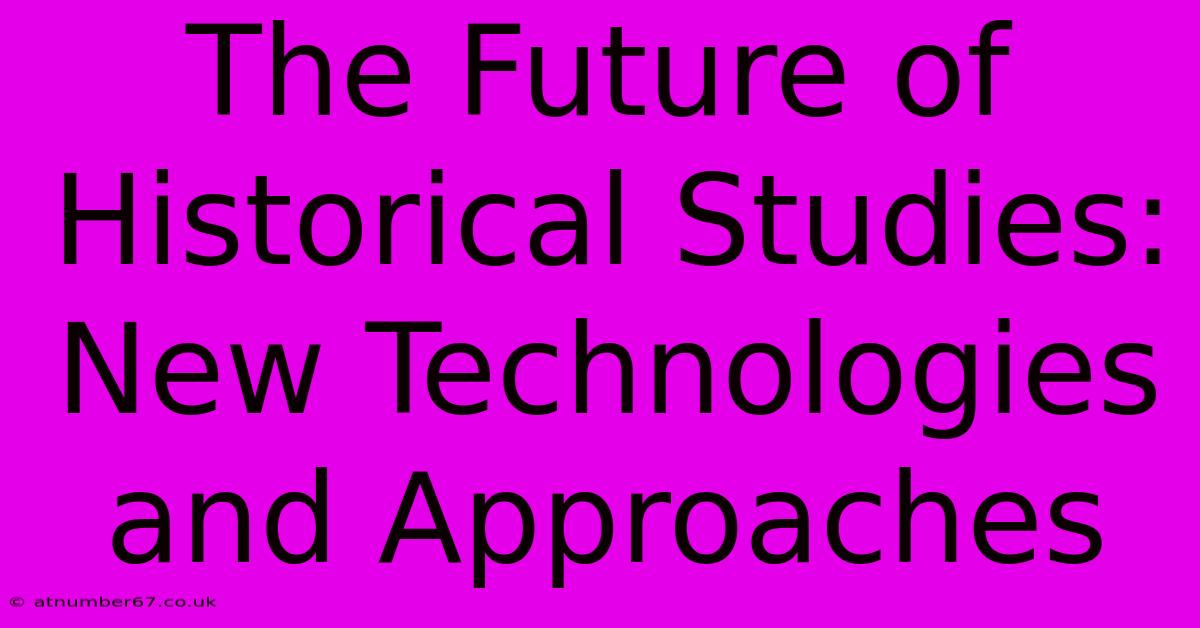The Future Of Historical Studies: New Technologies And Approaches

Table of Contents
The Future of Historical Studies: New Technologies and Approaches
The study of history is undergoing a dramatic transformation, fueled by rapid advancements in technology and innovative approaches to research and interpretation. Gone are the days when historians were solely reliant on dusty archives and painstakingly handwritten notes. Today, a vibrant landscape of digital tools and methodologies is revolutionizing how we understand the past, opening up exciting new avenues of inquiry and enriching our understanding of human experience.
Digital Archives and the Democratization of History
One of the most significant impacts of technology is the digitization of historical sources. Vast archives, previously inaccessible to all but a select few, are now available online. Projects like the Internet Archive and Europeana are making millions of historical documents, photographs, maps, and other materials readily available to researchers and the public alike. This democratization of access is profoundly important, fostering a more inclusive and participatory historical scholarship. Anyone with an internet connection can now engage with primary sources, contributing to a richer, more nuanced understanding of the past.
Challenges and Opportunities of Digital Archives
While the accessibility offered by digital archives is a major boon, challenges remain. Ensuring the accuracy and preservation of digital materials is crucial. The sheer volume of data also requires new approaches to analysis and interpretation, leading to the rise of digital humanities.
The Rise of the Digital Humanities
The digital humanities represent a fascinating intersection of history, computer science, and other disciplines. Historians are increasingly using computational methods to analyze large datasets, identify patterns, and uncover new insights. Techniques such as text mining, network analysis, and geographic information systems (GIS) are transforming historical research, revealing connections and relationships that were previously invisible.
Specific Applications of Digital Humanities
- Text mining: Analyzing vast corpora of historical texts to identify trends, themes, and keywords.
- Network analysis: Mapping social relationships and power structures across historical periods.
- GIS: Visualizing historical events and processes on maps, offering a spatial understanding of the past.
New Approaches to Historical Interpretation
Beyond technological advancements, new approaches to historical interpretation are reshaping the field. There's a growing emphasis on interdisciplinary collaboration, drawing on insights from fields like anthropology, sociology, and psychology to gain a more comprehensive understanding of the past. Historians are also increasingly engaging with postcolonial and feminist perspectives, challenging traditional narratives and offering more inclusive accounts of the past.
Beyond Traditional Narratives:
The focus is shifting from grand narratives of progress and decline to more localized, micro-historical studies. These studies offer a more granular and nuanced understanding of past societies and communities.
Ethical Considerations in Historical Research
The use of new technologies and approaches in historical studies also raises important ethical considerations. Questions surrounding data privacy, intellectual property, and the potential for bias in algorithms require careful attention. Historians need to be mindful of the ethical implications of their work, ensuring that their research is conducted responsibly and transparently.
The Future Landscape
The future of historical studies promises to be dynamic and exciting. New technologies will continue to emerge, further transforming how we research, analyze, and interpret the past. The digital humanities will likely play an increasingly important role, providing powerful tools for historical inquiry. And, perhaps most importantly, a growing awareness of diversity and inclusivity will enrich historical narratives, ensuring that a broader range of voices and experiences are heard. The past, once a seemingly fixed and immutable entity, is now becoming a more fluid and dynamic field of study, constantly evolving through new technological and interpretative approaches. This evolution promises a richer, more complete, and ultimately more meaningful understanding of the human experience across time.

Thank you for visiting our website wich cover about The Future Of Historical Studies: New Technologies And Approaches. We hope the information provided has been useful to you. Feel free to contact us if you have any questions or need further assistance. See you next time and dont miss to bookmark.
Featured Posts
-
Discovering Athiya Shettys Husbands Background
Apr 13, 2025
-
Sara Davies Dad A Legacy Of Entrepreneurship
Apr 13, 2025
-
Kl Rahuls Age An Unconventional Path To Success
Apr 13, 2025
-
His Daughters Memory Grace Millanes Fathers Mission
Apr 13, 2025
-
Alan Walkers Net Worth Living The Dream
Apr 13, 2025
